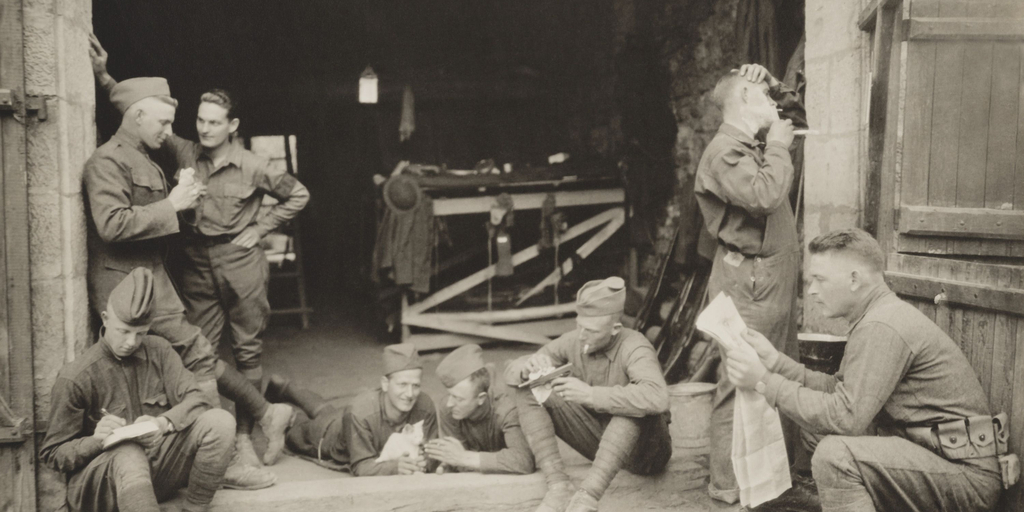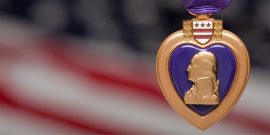Our media, our legislation, and our culture continue to popularize a stilted image of who the modern veteran is.
The American Soldier-Scholar
Our Middle Eastern wars have been, if not catastrophic, certainly sobering. We are now almost 20 years removed from the outrage of 9/11, the justification our government used for bombing several tyrannies into the Stone Age and then trying to turn them into good modern liberals. These wars, it seemed, were partly an attempt to show how powerful America was. But we have learned instead that we are weak, despite our government’s ability to deliver destruction around the world in our name.
Perhaps imperial power maddened our elites, tempting them to play with the lives of millions of strangers while endangering our own tranquility and encouraging partisan strife. To avenge the men and women who died on 9/11 is natural, of course. Defending the nation’s honor is the only way to dissuade our enemies from attempting to humiliate or harm us. But playing God in the Middle East is an altogether different matter.
While madness led our elites into these catastrophes, patriotism led many young men and women to enlist in order to serve America. The government, in our name, did worse, morally, to our own troops than to strangers, forcing them to kill and die only for the nation to indifferently move on from the causes that demanded their sacrifice, despite the fact that the government is only very gradually ending the technological slaughter.
In arrogance and patriotism, respectively, we see the worst and the best in us. And the government and the military are, respectively, the least and the most trusted institutions in America. These are two ways of thinking about what it means to be representative. Though we vote on our government every two years, we know our military is more truly of the people, by the people, and for the people than our politicians, who mostly serve themselves. And while America’s arrogant politicians casually upend genuine human community—at home and abroad—the patriotic military is the only institution building it up.
The Soldier-Scholar
Many books and movies have been written by and about veterans of these wars. We read and watch them because we admire the manly patriotism it takes to face death and achieve greatness. The one I love most is Scott Beauchamp’s recent Did You Kill Anyone? In an age of self-importance, of branding, and of oversharing, here’s a book that eschews most autobiographical detail in favor of a reflection on American society and cultural criticism in light of our recent wars.
Did You Kill Anyone? is the story of a boy becoming both a man and a thinker, learning about war and about civilization. In a heavy trunk of books he takes with him to war, Beauchamp literally bears the burden of learning about what threatens civilization, understanding our yearning for nobility, and especially, grasping what it means to keep faith with one another. In addition to doing his duty and risking his life, he educates himself by learning from generations of intellectuals before him.
In this strange way, the importance of civilization is itself affirmed as something akin to piety—a discovery of a tradition worth fighting for. Civilized men fight for their fellow soldiers, and everyone fights for family or home. But civilization itself also requires defending and, to be defended, it must first be learned.
In this clearly articulated, well-organized book, I see the self-portrait of a young man seeking education in what it means to be civilized. But I also see a picture of an entire generation that badly needs this kind of crash course, though without realizing it. Beauchamp was in certain ways a typical kid from the Midwest, but he has become something unusual in our times—a scholarly patriot, an essayist, and a citizen concerned for his country’s future.
This rare, soldier-scholar perspective makes him confident as a man and heartbroken as an American. How is it worth fighting for your country abroad if its civilians are tearing it apart at home, searching for meaning in their economic, political, and social crises? He comes to a conclusion: the military is sane in a country going insane. It knows more of community than our communities do!
The Military Community
In an age obsessed with post-traumatic stress disorder, Beauchamp points to the power of the military community to withstand trauma, to prepare for the worst, and to thrive during a crisis. Unlike the actions of our government, the military is not damaging Americans—boys go there to become men, even if they’re not aware of it. Coming as they do out of an increasingly crazy society, in some ways they are already damaged before they enlist. The military offers them sanity and strength at last.
The military is a family, each unit living in an intimacy civilians hardly glimpse and rarely experience. It is also a hierarchy of jobs and honors where everyone is needed and everyone can be useful if he chooses to be. Soldiers acquire particular habits, perform specific duties, and, in learning to gain the respect of others, gain self-respect and a capacity to judge others in turn.
Clarity of purpose and coherence of organization are far more available in the ranks than they are in a society where freedom is increasingly experienced as chaos rather than pleasure, opportunity, or plenty. Accordingly, the chapters of the book talk about ritual, community, hierarchy, honor, and tradition. Beauchamp thinks civilians have much more to learn about life from the military than the other way around. And it’s not just about the military’s strict discipline, but also about learning how to live with and serve others.
Educating Character
It may seem a matter of chance that the military attracts so many admirable people, but we should know that it’s not. These are people who sense that civilian life is dishonorable and choose the alternative because the risk of death is preferable to dishonor. Manly patriotism is the first virtue in Aristotle’s Ethics, and members of the military are almost the only ones who embody it today, dealing with danger and risking their lives for what we would hope is a just cause.
Aristotle suggests that only on the basis of this manly patriotism can character be educated for freedom. Institutions which aren’t anchored in this purpose—to give human life its natural dignity by summoning our greatest virtues—debase us. We mistrust these institutions, but mistrust ourselves more. We’re unable to change them or, indeed, ourselves. Lacking the limitations of military life, our civilian world also lacks its community, and our freedom of choice catches up to us. We eventually find out that the many choices we make don’t stick and often don’t add up to a coherent whole. Moreover, we don’t have others around us who love and respect us even as we love and respect them.
We cannot live without communities, but we do not know how to build them. Despite our prosperity, we’re unhappy. Despite various forms of progress, we lack confidence in the future. And in important ways, there isn’t much of a future—we don’t really want more of ourselves. We are existentially bored without realizing what’s happening to us. We’re decadent, but not even in the midst of great popular anger do we organize to improve our ways. Perhaps the first thing we need is to test whether we are strong enough to face what’s wrong with us.
The Importance of Self-Reflection
Beauchamp starts with a chapter on boredom, where he shows how, in military life, even this experience takes on a strange importance, as the soldier falls back on his own internal resources and must prove his humanity to himself in order to stay sane. Self-reflection is forced on him when there’s nothing new to distract him. That’s strangely like everyday civilian life, except we find it so much easier to avoid self-reflection.
War is the most boring thing you can possibly experience. But it makes you into a connoisseur of boredom. You begin to see the intricate patterns of your own mind at work inside of the boredom itself. Nervous staccato rhythms of thought droop into languid melodies. Your reveries eventually feel less desperate. You’re no longer lost inside of vast segments of time, but somehow have yourself become part of the flux. You’ve adapted to it. The boredom is still boredom, only it’s become interesting and natural feeling. I spent 16 months in Iraq during my first deployment and I only remember a handful of moments. The rest were spent wandering inside of my own head, becoming more and more intimate with the shape of my fears, desires and dreams.
The other unorthodox chapter is on smoking, and it too reveals the strange character of human nature and Beauchamp’s own poetic turn of mind:
The first serious short story I tried to write was about my family. Thanksgiving in a house in rural Missouri and a long thin wisp of cigarette smoke coiled like a translucent serpent moving between rooms. Follow the smoke from one person to another. Past my laughing aunt flicking her long, skinny cigarette into a heavy glass ash tray. Into the hallway where a bearded uncle anxiously waits for someone to leave the bathroom. Into the living room where a grandpa falls asleep with a butt precariously balanced on top of a beer can. Now follow the smoke not only through physical space but through time as well. Entire generations connected by a pungent ash. Decades marked off in cartons of time.
When we recall our past life and the people who have made us who we are, it reveals something elusive, but important about our predicament: we have to face the possibility that the way things are—and the way we are—will change. We have to face our limits and our mortality. To do that without a moral and intellectual collapse, we need a solid, real, reliable, powerful community.
Beauchamp’s book is a revelation, shedding light on how and why the military can build a community, educate character, and persuade Americans to serve a purpose greater than themselves—a purpose that would be impossible to attain without their consent and participation. In treating the military as an education rather than a job or a weapon, he allows us to see the desires and restlessness of the American heart without exacerbating them to madness through glamour or psycho-drama.
He shows how we can overcome self-importance and self-obsession when we aspire to greatness together. His contempt for materialism and the therapeutic society seems to stem from the fear that these things make it impossible for us to achieve anything worthwhile or lasting. Every friend of liberty whose heart also yearns for greatness should read Beauchamp’s book, which offers friendship and counsel, and is, therefore, deeply human.



